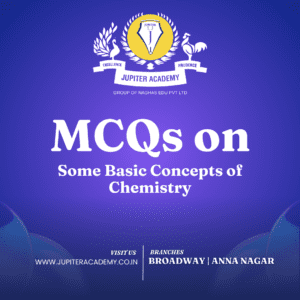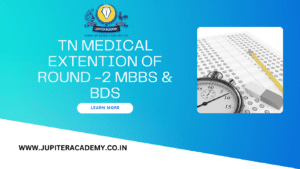NEET 2025: OMR Sheet Filling Tips to Avoid Mistakes Preparing...
Read MoreNEET mcqs on some basic concepts of chemistry

The chapter “Some Basic Concepts of Chemistry” is one of the most important chapters in the NEET Chemistry syllabus. It covers the fundamental concepts of chemistry, such as the nature of matter, atomic structure, the periodic table, moles and molar mass, stoichiometry, and chemical equations. These concepts are essential for understanding the other chapters in chemistry, and they are also frequently tested in the NEET exam.
Here are some of the reasons why the chapter “Some Basic Concepts of Chemistry” is important for the NEET exam:
- It covers the fundamental concepts of chemistry, which are essential for understanding the other chapters in chemistry.
- It is frequently tested in the NEET exam, so students need to have a strong understanding of these concepts in order to do well in the exam.
- The concepts in this chapter are used in many other fields, such as biology, physics, and engineering. So, having a good understanding of these concepts will be beneficial for students’ future studies and careers.
The chapter “Some Basic Concepts of Chemistry” is not very difficult, but it is important to study it carefully and practice solving questions from this chapter. By doing so, students can improve their understanding of the concepts and be well-prepared for the NEET exam.
NEET mcqs on some basic concepts of chemistry
Sure, here are some multiple-choice questions (MCQs) on basic concepts of chemistry along with their answers:
1. What is the atomic number of carbon?
a) 6
b) 12
c) 14
d) 16
Answer: a) 6
2. Which subatomic particle is responsible for the chemical properties of an element?
a) Proton
b) Electron
c) Neutron
d) Nucleus
Answer: b) Electron
3. What is the chemical symbol for gold?
a) Go
b) Gd
c) Au
d) Ag
Answer: c) Au
4. How many valence electrons does an oxygen atom have?
a) 2
b) 6
c) 8
d) 10
Answer: b) 6
5. What is the chemical formula for water?
a) H2O2
b) CO2
c) H2O
d) O2
Answer: c) H2O
6. Which of the following is a noble gas?
a) Oxygen
b) Hydrogen
c) Neon
d) Nitrogen
Answer: c) Neon
7. What is the formula of methane, a common natural gas?
a) CH4
b) CO2
c) C2H6
d) H2O
Answer: a) CH4
8. Which of the following is a non-metal?
a) Sodium (Na)
b) Oxygen (O)
c) Calcium (Ca)
d) Iron (Fe)
Answer: b) Oxygen (O)
9. What is the chemical name for table salt?
a) Sodium chloride
b) Sodium nitrate
c) Sodium sulfate
d) Sodium carbonate
Answer: a) Sodium chloride
10. Which gas is responsible for the blue color of the Earth’s sky?
a) Oxygen
b) Carbon dioxide
c) Nitrogen
d) Oxygen
Answer: c) Nitrogen

JEE mcqs on some basic concepts of chemistry
1. What is the chemical formula of sodium chloride?
a) NaCl
b) Na2Cl
c) NaCl2
d) Na2Cl2
Answer: a) NaCl
2. Which of the following elements is a noble gas?
a) Hydrogen (H)
b) Oxygen (O)
c) Neon (Ne)
d) Chlorine (Cl)
Answer: c) Neon (Ne)
3. What is the atomic number of carbon?
a) 4
b) 6
c) 8
d) 12
Answer: b) 6
4. How many moles of water molecules are there in one mole of water (H2O)?
a) 1
b) 2
c) 3
d) 4
Answer: b) 2
5. Which gas is evolved when hydrochloric acid (HCl) reacts with sodium hydroxide (NaOH)?
a) Oxygen (O2)
b) Hydrogen (H2)
c) Chlorine (Cl2)
d) Carbon dioxide (CO2)
Answer: b) Hydrogen (H2)
6. What is the chemical formula for sulfuric acid?
a) H2SO4
b) HCl
c) HNO3
d) H3PO4
Answer: a) H2SO4
7. Which of the following is a transition metal?
a) Sodium (Na)
b) Zinc (Zn)
c) Potassium (K)
d) Calcium (Ca)
Answer: b) Zinc (Zn)
8. What is the oxidation state of oxygen in most compounds?
a) -1
b) 0
c) +1
d) -2
Answer: d) -2
9. Which gas is responsible for the pungent smell of rotten eggs?
a) Oxygen (O2)
b) Sulfur dioxide (SO2)
c) Hydrogen sulfide (H2S)
d) Carbon monoxide (CO)
Answer: c) Hydrogen sulfide (H2S)
10. What is the molar mass of carbon dioxide (CO2)?
a) 12 g/mol
b) 16 g/mol
c) 28 g/mol
d) 44 g/mol
Answer: d) 44 g/mol
Here are some tips for studying the chapter “Some Basic Concepts of Chemistry”:
- Start by reading the chapter carefully and making sure you understand the key concepts.
- Solve practice questions from the chapter to test your understanding.
- If you are struggling with any concepts, ask your teacher or tutor for help.
- Make a study plan and stick to it.
- Review the chapter regularly to keep the concepts fresh in your mind.
By following these tips, you can make sure that you are well-prepared for the chapter “Some Basic Concepts of Chemistry” in the NEET exam.
The number of questions asked from the chapter “Some Basic Concepts of Chemistry” in the NEET exam is around 10-15. So, it is a relatively small chapter, but it is important to study it well.
TN Medical 2024 Counseling: Extension of Round 2 for MBBS & BDS
TN Medical 2024 Counseling: Extension of Round 2 for MBBS...
Read MoreTENTATIVE ROUND-II COUNSELLING SCHEDULE FOR ADMISSION TO MBBS/BDS
Registration Starts from 11-09-2024 10:00 A.M to 13-09-2024 05:00 P.M....
Read MoreNEET mcqs on some basic concepts of chemistry NEET mcqs on some basic concepts of chemistry. NEET mcqs on some basic concepts of chemistry NEET mcqs on some basic concepts of chemistry NEET mcqs on some basic concepts of chemistry NEET mcqs on some basic concepts of chemistry NEET mcqs on some basic concepts of chemistry NEET mcqs on some basic concepts of chemistry NEET mcqs on some basic concepts of chemistry NEET mcqs on some basic concepts of chemistry NEET mcqs on some basic concepts of chemistry
JEE mcqs on some basic concepts of chemistry JEE mcqs on some basic concepts of chemistry JEE mcqs on some basic concepts of chemistry JEE mcqs on some basic concepts of chemistry JEE mcqs on some basic concepts of chemistry JEE mcqs on some basic concepts of chemistry JEE mcqs on some basic concepts of chemistry JEE mcqs on some basic concepts of chemistry JEE mcqs on some basic concepts of chemistry JEE mcqs on some basic concepts of chemistry JEE mcqs on some basic concepts of chemistry JEE mcqs on some basic concepts of chemistry JEE mcqs on some basic concepts of chemistry





